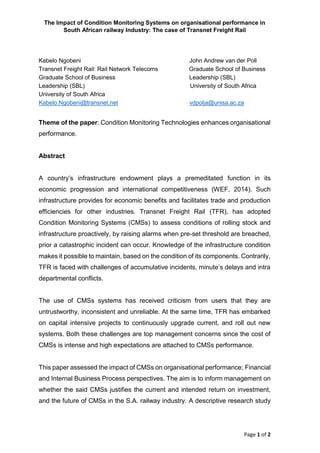
Impact of Condition Monitoring on Transnet Freight Rail Performance
- 1. The Impact of Condition Monitoring Systems on organisational performance in South African railway Industry: The case of Transnet Freight Rail Page 1 of 2 Kabelo Ngobeni John Andrew van der Poll Transnet Freight Rail: Rail Network Telecoms Graduate School of Business Graduate School of Business Leadership (SBL) Leadership (SBL) University of South Africa University of South Africa Kabelo.Ngobeni@transnet.net vdpolja@unisa.ac.za Theme of the paper: Condition Monitoring Technologies enhances organisational performance. Abstract A country’s infrastructure endowment plays a premeditated function in its economic progression and international competitiveness (WEF, 2014). Such infrastructure provides for economic benefits and facilitates trade and production efficiencies for other industries. Transnet Freight Rail (TFR), has adopted Condition Monitoring Systems (CMSs) to assess conditions of rolling stock and infrastructure proactively, by raising alarms when pre-set threshold are breached, prior a catastrophic incident can occur. Knowledge of the infrastructure condition makes it possible to maintain, based on the condition of its components. Contrarily, TFR is faced with challenges of accumulative incidents, minute’s delays and intra departmental conflicts. The use of CMSs systems has received criticism from users that they are untrustworthy, inconsistent and unreliable. At the same time, TFR has embarked on capital intensive projects to continuously upgrade current, and roll out new systems. Both these challenges are top management concerns since the cost of CMSs is intense and high expectations are attached to CMSs performance. This paper assessed the impact of CMSs on organisational performance; Financial and Internal Business Process perspectives. The aim is to inform management on whether the said CMSs justifies the current and intended return on investment, and the future of CMSs in the S.A. railway industry. A descriptive research study
- 2. The Impact of Condition Monitoring Systems on organisational performance in South African railway Industry: The case of Transnet Freight Rail Page 2 of 2 following a quantitative statistical model, was conducted to recommend the validated final course of action. The results of the study showed a mixed perception on how CMSs are impacting on the defined organisational performance. It was concluded that CMSs form the basis for long-term financial planning that settles the intentions of maintenance, operations and investment budgeting, thereby subsidising the extension of cost-effective life cycle of assets. The positive findings also recommend and advise management on the way-forward that, by adopting CMS’s improves utilisation of assets, and enhance revenue generation. The negative findings recommend management to implement CMSs development plan to rectify deviating practices and that they take informed decision on future deployment.
